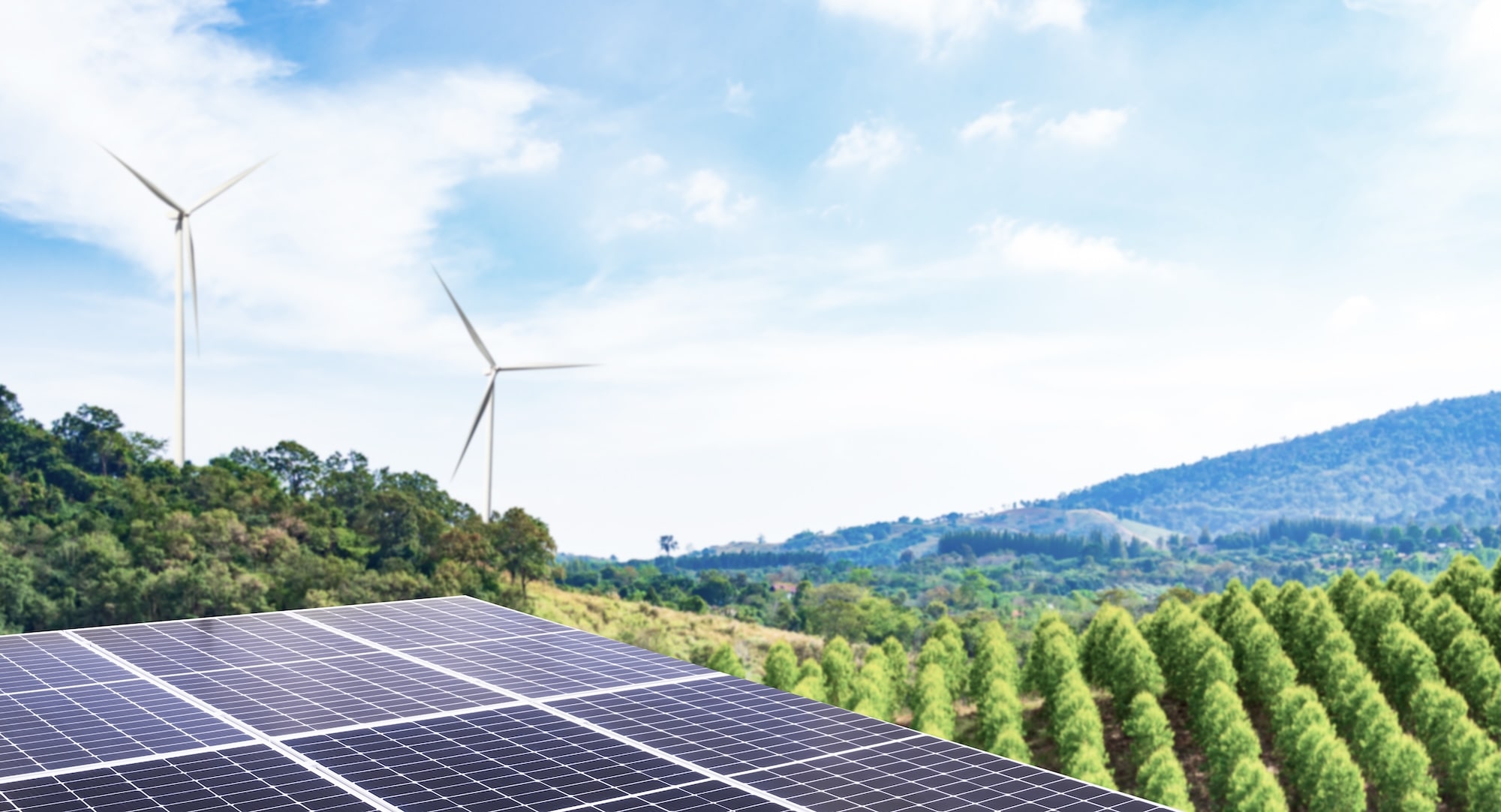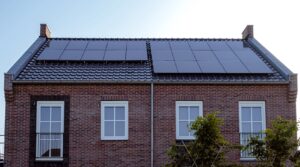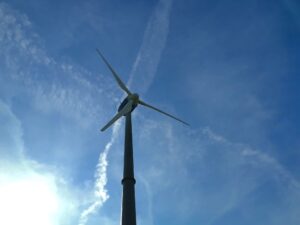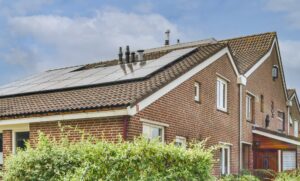
Across the UK, more people are turning to renewable energy to save money on bills and do their bit for the environment. The government’s push towards net-zero has also made clean energy a bigger priority for homeowners, businesses, and public sector organisations.
Two of the most recognised options are solar panels and wind turbines. Both generate clean power, but they work in very different ways and aren’t always suited to the same settings. Many of our customers ask us which is better for a typical property in the North West.
How Do Solar Panels and Wind Turbines Work?
How Solar Panels Generate Energy
Solar panels use photovoltaic (PV) cells to capture sunlight and turn it into electricity. The panels convert sunlight into direct current (DC), which is then changed into alternating current (AC) by an inverter so it can power your home or business.
For most UK properties, solar panels are a simple and reliable option. They can be fitted to homes, schools, offices, warehouses, and even public buildings. Once installed, they quietly get on with generating energy whenever the sun is shining, without any moving parts or disruption.

How Wind Turbines Generate Energy
Wind turbines work differently. They rely on moving air to spin large blades, which then turn a generator to produce electricity. The stronger and more consistent the wind, the more power the turbine can make.
While smaller turbines can be installed on individual properties, the majority of wind power in the UK comes from large wind farms. These are often offshore or in very open rural areas where wind speeds are high.
For most homes and businesses, especially in towns or built-up areas, wind turbines aren’t practical compared to solar panels.

Solar vs Wind: Key Advantages and Disadvantages
Advantages of Solar Panels
For most UK homes and businesses, solar panels are the clear winner. They fit neatly onto rooftops, meaning you don’t need extra land or planning permission in most cases. Once installed, they need very little maintenance and will reliably generate power for 25 years or more.
Solar also comes with strong financial benefits. Installations are currently VAT-free, and with the Smart Export Guarantee (SEG), you can earn money for any surplus electricity you export back to the grid.
When combined with battery storage, solar panels let you make the most of your own power, even at night.
Disadvantages of Solar Panels
The main drawback is that solar panels only produce electricity during daylight hours, and output is naturally lower in winter.
However, battery storage and the UK’s relatively steady daylight hours mean that solar is still a reliable and cost-effective option for most households.
Advantages of Wind Turbines
Wind turbines can produce electricity day and night, and large-scale wind farms make an important contribution to the UK’s renewable energy mix. On the right site, a turbine can generate significant amounts of power.
Disadvantages of Wind Turbines in the UK
For individual property owners, turbines are rarely practical. They need plenty of open land, consistent wind speeds, and planning permission, which can be difficult to secure.
Costs for small-scale systems are high, and issues like noise, visual impact, and risks to wildlife are common concerns.
This is why, while wind is vital nationally, solar panels remain the more accessible, affordable, and straightforward choice for most homeowners and businesses looking to generate their own clean energy.
Cost Comparison: Solar Panels vs Wind Turbines
Installation and Maintenance Costs
When it comes to installation, solar panels are usually much more straightforward than wind turbines. Panels can be fitted onto most homes and business rooftops without the need for extra land or complex groundwork. The process is efficient, and once installed, solar systems require very little upkeep.
By contrast, wind turbines tend to be more expensive to set up, especially at smaller scales. They often need planning permission, a large open site, and stronger foundations. On top of that, turbines include moving parts that need regular servicing and occasional repairs, which adds to the lifetime cost.

Return on Investment
For most UK households, solar panels pay back faster than a small-scale wind turbine. This is partly thanks to their low running costs and government support schemes like the Smart Export Guarantee (SEG), which lets you earn money from exporting surplus energy back to the grid.
Wind power can deliver a strong return in very rural, windy locations, but for the majority of property owners, solar is more reliable, affordable, and practical.
Pairing panels with battery storage makes the investment even stronger, as it allows you to use more of your own electricity instead of buying from the grid.
Practicality in the UK
Solar Power in the UK Climate
A common misconception is that solar panels don’t work well in the UK because of our cloudy weather but that’s simply not true. Modern photovoltaic (PV) panels are designed to generate electricity from daylight, not just direct sunlight. That means even on overcast days, your panels continue to produce energy efficiently.
The UK’s mild climate is actually beneficial for solar power. Panels operate best in cooler temperatures, and steady daylight throughout the year makes them a consistent source of renewable energy.
It’s why thousands of homes and businesses across the North West now rely on solar as a dependable, low-maintenance way to reduce energy costs.

Wind Power in the UK
Wind power certainly has a role to play in the UK’s overall renewable energy mix, but it’s not the most practical choice for most individual properties.
To generate enough energy to be worthwhile, turbines need consistent wind speeds and plenty of open space, conditions usually found in rural or coastal areas rather than built-up towns or cities.
For most homeowners or urban businesses, the space, planning requirements, and noise concerns make wind systems difficult to justify compared to solar panels.
Which Renewable Energy Source Is Better?
For UK Homeowners
For the majority of UK homeowners, solar panels are the clear choice. They’re easier to install, require less maintenance, and start delivering savings straight away.
With battery storage, homeowners can also store surplus energy to use in the evenings, making solar a reliable and future-proof option.
For Businesses and Larger Properties
Solar panels also make strong financial sense for commercial and public sector buildings. They can be scaled to meet energy demands, support net-zero targets, and demonstrate a clear commitment to sustainability.
In some rural cases, hybrid systems that combine both solar and wind can maximise energy independence, but solar remains the more flexible and cost-effective solution overall.
Bolton Electrical’s Recommendation
At Bolton Electrical Services, we specialise in helping homes, businesses, and public organisations across Bolton and the North West harness the benefits of solar energy.
While wind power has its place in large-scale projects, solar panels offer the best balance of practicality, performance, and affordability for most property owners.
If you’re considering renewable energy for your property, our team can design a solar system that fits your space, budget, and long-term goals, helping you take control of your energy future.
Frequently Asked Questions (FAQ)
Which is better: solar panels or wind turbines?
For most UK homes and businesses, solar panels are the better option. They’re easier to install, more affordable, and require far less maintenance than small-scale wind turbines.
Can you combine solar panels and wind turbines?
Yes. Hybrid systems that use both solar and wind power do exist, but they’re usually best suited to rural or off-grid locations where space and wind conditions allow.
Are solar panels cheaper than wind turbines?
Yes. Domestic and small commercial solar installations generally cost less than wind turbines of similar capacity, and they’re quicker to install with fewer ongoing maintenance costs.
What are the disadvantages of wind turbines in the UK?
Wind turbines can be noisy, require planning permission, and need open, windy spaces to perform efficiently. In many parts of the UK, they’re not suitable for typical residential or city-based sites.
How long do solar panels and wind turbines last?
Solar panels typically last between 25 and 30 years with minimal upkeep. Small wind turbines can last around 20 years, but moving parts mean they need more regular servicing and repairs.
Do solar panels work better than wind in the UK climate?
Yes. Solar panels perform well even on cloudy days and are more reliable in urban or suburban areas where wind speeds are inconsistent.
